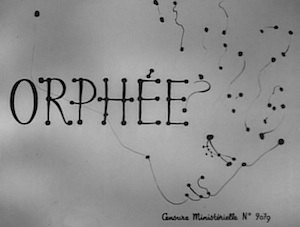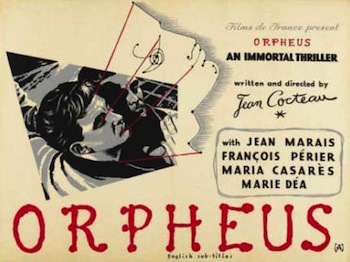Home > 1950 - 1959 > Orphée / Orpheus
Orphée / Orpheus

Year - 1950
Studio - Andre Paulve Film, Films du Palais Royal
Stars - Jean Marais, François Périer, María Casares, Marie Déa
Director - Jean Cocteau
Writing Credits - Jean Cocteau
Music - Georges Auric
Synopsis
Orpheus (Jean Marais) is a poet, popular with the public, but scorned by fellow Left Bank intellectuals. At a cafe, he sees a young poet struck by speeding motorcycles, and a mysterious woman, the Princess (María Casare) instructs him to assist her and her chauffeur, Heurtebise (François Périer) with the victim. In the car, a monotonous voice from the radio fascinates Orpheus, who realizes that the boy is dead. They go to a deserted house where the Princess revives the dead poet, and he follows her through a mirror. The chauffeur takes Orpheus back to his home and to his wife, Eurydice (Marie Déa). She is eager to tell him that she is pregnant, but he ignores her to return to the car to listen to the voice on the radio. Eurydice leaves the house and is struck and killed by the same two motorcycles that hit the young poet.

The chauffeur sympathizes with Orpheus, takes him back to the deserted house, and shows him how to follow Eurdice through the mirror into the underworld. There, with his wife is the Princess (who represents his personal death). She confesses that his wife died so that she could have him for herself. Three judges hold court to consider the situation, and rule that Euridice and Orpheus may return to their world, but under the condition that Orpheus never look at his wife again.
Orpheus makes a half-hearted attempt to avoid looking at Eurdice, but accidently sees her face in the car mirror. She instantly vanishes. He again follows Heurtebise through the mirror and back to the underworld, this time a much more arduous journey. When they arrive, the Princess makes a decision that will result in her own eternal destruction, that time go backwards to the point where Eurdice was about to tell Orpheus of her pregnancy. This time he listens and is ecstatic with the news.
Trailer
Orpheus, set in contemporary Paris, is based on a classic Greek myth. The film is the central part of Jean Cocteau's Orphic Trilogy, which consists of The Blood of a Poet (1930), Orpheus (1950) and Testament of Orpheus (1960).
Orpheus was suggested for this site by Karine Philippot.
